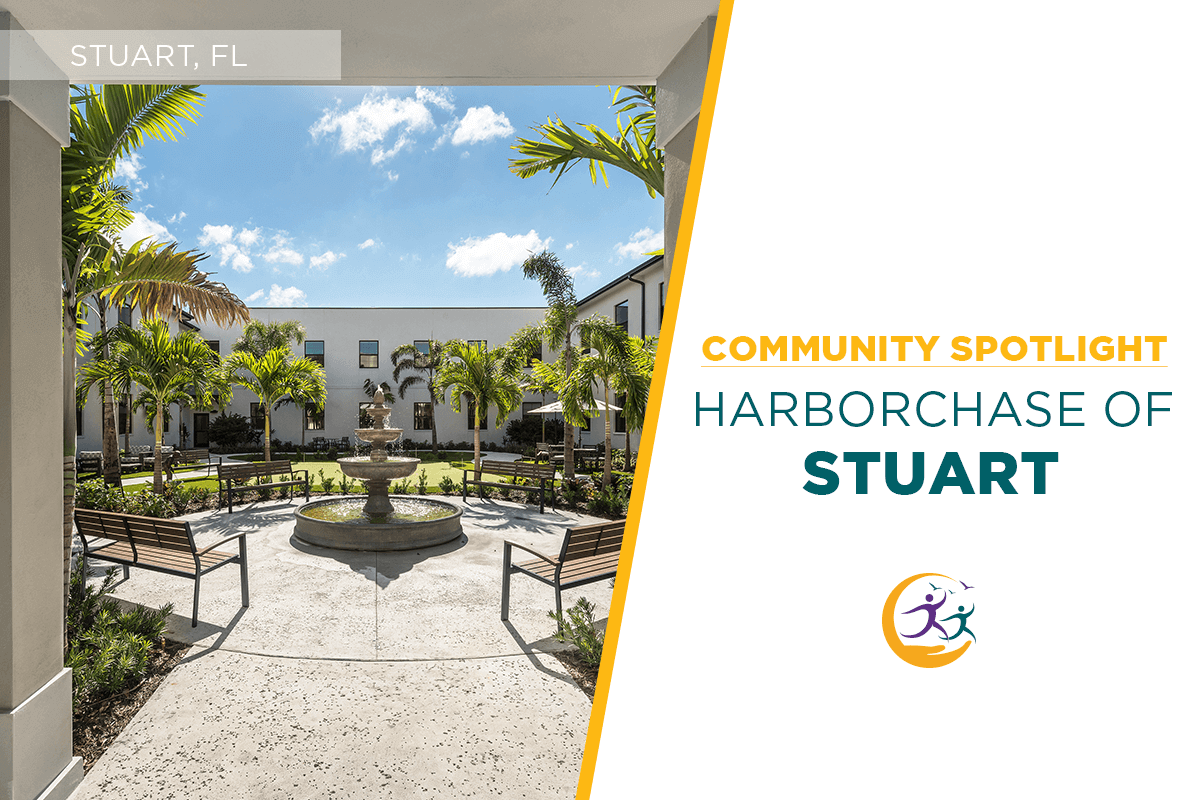7 Tips For Easing The Transition Into Memory Care
Posted By HarborChase on May 1, 2021Moving is never fun or easy, especially if moving from a longtime home to a new and unfamiliar place like a senior living community. This transition is even harder for those with Alzheimer’s or other dementias, moving into a memory care community. While this is often the best place possible for these individuals, the transition can be challenging and distressing.
HarborChase Senior Living offers specialized dementia care, transitional memory care, and memory care programs throughout the United States. We know that transitioning a family member into a memory care community can be overwhelming and emotional—both for you and them. We’re sharing some tips on how to make this transition as smooth and comfortable as possible.
1. Ensure You’ve Chosen The Best Program
Choosing the right memory care community is essential in assuring your family member’s health and wellness. It’s important that you fully understand their condition and needs to find a program that will be appropriate for them. While doing research, helpful questions to ask include:
- What is the staff-to-resident ratio? How much personal attention will my family member receive?
- How is your staff trained in managing dementia and other memory loss?
- What programs (mental and physical) are offered?
- How often do you communicate with families?
- Is there a transitional program available?
- How do you accommodate special needs or preferences?
- What kind of security is in place?
Choosing a memory care program that you are comfortable with and confident in is crucial for giving you peace of mind. Knowing that your family member is cared for, stimulated, respected, and safe can help ease the transition on your end.
2. Visit The Community Before The Move
Once you’ve decided on a memory care community, it can help to visit it several times before the move. Allow your family member to explore the neighborhood, meet the caregivers and other residents,and familiarize themselves with the setting. Some communities will even have events or lunches that are open to the public that you and your loved one could attend.
HARBORCHASE TIP: Depending on how advanced your family member’s dementia is, it can often be a good idea not to mention the move in advance. Doing so can cause anticipation anxiety, which can result in extreme negative feelings about the upcoming move. Visiting the community before the move can still be a good idea; just avoid mentioning “the move” or their “new home.” This way, your parent can still become familiar and comfortable with the environment without feelings of apprehension and fear.
3. Share Information with the Associates
Before move-in day, meet with the memory program staff and give them any information that might help make your family member comfortable. While they will ask for medical history and medication lists, tell them your family member’s likes, dislikes, hobbies, special needs, favorite foods, interests, or anything else notable. This can help the staff create an enjoyable and welcoming environment for your parent and help them connect with other residents with a similar background.
4. Bring Familiar Items
When moving your family member into their new apartment, be sure to surround them with familiar things from home. Even in a new and unfamiliar place, seeing recognizable items can create a sense of familiarity and safety. Bring their favorite blanket or pillow from home, decorate the room with photos of family and friends, or bring a small speaker that can play their favorite music.
5. Be Prepared for Hard Moments
The moment you leave your family member in their new home and drive home will be emotional: you know it’s the best place for them, and eventually, they will love it, but that doesn’t make it any less hard.
It can take a few weeks or even longer for someone with Alzheimer’s to adjust to a new environment, and setbacks are to be expected. Your family member may tell you they are lonely; they may beg you that they want to go home; they may even lash out in anger. These moments can be heartbreaking, but it’s important to remind yourself that this is all part of the transition, and eventually, they will be telling you about their new friends or what craft they made that day.
6. Give Them Time to Adjust
During the first week or two after the move, make yourself available to your loved one, but give them time to adjust on their own. The move may have been a shock to their system, so they need time to settle and establish a new routine. Let your loved one and the staff know that you are just a phone call away to talk and check-in.
7. Relax
After the move-in is complete and your family member is settling in, you can now take some time for yourself to simply relax. Caring for a family member with dementia can be time-consuming and overwhelming. Deciding to move them into a memory care community can be difficult, but ultimately, you’ve put their health, safety, and well-being first.
Now is an excellent opportunity to focus on yourself—all while having peace of mind that your family member is receiving professional, dedicated, and round-the-clock care.
HarborChase Senior Living offers specialized memory care and transitional dementia care at a number of our communities throughout the United States. Each of these world-class programs ensures that residents are given the tools they need to thrive and succeed emotionally, physically, and mentally.
If you care for or have a family member with Alzheimer’s disease or related-dementia and are wondering if or when you should consider a memory care community like HarborChase, we invite you to reach out to our team with questions. We’re here to help you and your family as you navigate this complicated process.
Categories: HarborChase Senior Living, Memory Care


